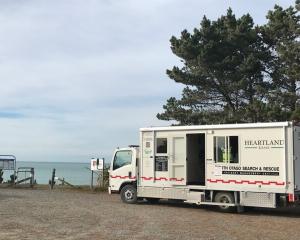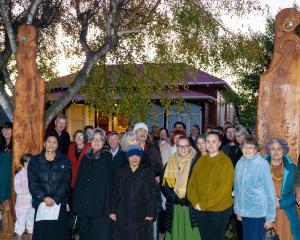On May 8, all psychoactive products were banned following a Government crackdown on the controversial products, but new R18 aromatherapy products are on sale in Oamaru.
The ''burning incense'' products are designed to be used in an incense-burning vessel, or similar, and have a ''gentle euphoric effect'', but Oamaru police have been made aware they are being smoked as a substitute for legal highs.
Asked by the Otago Daily Times about the health effects of the products, a Ministry of Health Office of Psychoactive Substances representative said an investigation would be carried out.
''It claims to have a euphoric effect, meaning it is potentially a psychoactive substance, and the ingredients are not specified on the packaging,'' the representative said.
''If a product is labelled 'not for human consumption' then do not smoke it. If it is smoked, it should not be sold to people under the age of 18.''
Senior Sergeant Jason McCoy, of Oamaru, said police were also investigating its sale for any legislation breaches.
Oamaru police identified the product as ''Firebird''. It is advertised as ''the ultimate in aromatherapy'', and a 3g packet was yesterday selling for $18 at Super Save, in Oamaru.
Super Save closed its doors following the ban on psychoactive products, a sign on the door stating it was closed ''until further notice''. However, it recently reopened.
A salesman said the packet of Firebird, bought by the Otago Daily Times yesterday, was the last in stock - it had been very popular.
The ingredients are not listed, and it is described as a ''proprietary blend of exotic South American and Southeast Asian herbs, herbal extracts, essential oils, natural flavour and fragrances designed to stimulate the mind and body when burned in an appropriate environment''.
While it is described as non-toxic in nature, not containing any illegal or restricted substances, it is an R18 product and ''not intended for human consumption''.
Snr Sgt McCoy said legal highs had been an underlying cause of most crimes in Oamaru for a long time, by people either offending under the influence or offending to fund the addiction. But since the ban in May, crime had fallen.
''It is a concern that people have substituted [burning incense] for [legal highs] but we're yet to deal with the extreme [effects].''
National Poisons Centre toxicologist Dr Leo Schep, of Dunedin, said those who chose to smoke burning incense did so at their own risk.
''When you smoke it, you don't know what it's been changed into ... we don't know what happens when people smoke it.''
There would likely be an increased risk of respiratory problems in the long term, but he did not anticipate it would have any ''extreme'' effects. However, with no specific ingredients listed, it was possible people could have allergic reactions.
''Probably, it's going to do nothing for you - it's just another attempt to sell plant matter.''
''[But] you don't know.''
Since the use, sale and manufacture of the products were made illegal in May, the number of calls to the National Poisons Centre had reduced dramatically - from about 70 in April to no more than eight in the past month, Dr Schep said.
Waitaki Mayor Gary Kircher said the resurfacing of products in Oamaru highlighted the difficulty of legislating and banning them.
''I remain adamant that we don't need this rubbish in our town and district,'' he said. A New Zealand website, Bona, with the slogan ''be organically naturally aware'', is selling five sachets, plus one free, for $100.
The website says it contains ''no illegal, banned or restrictive substances such as cannabinoids, not legal highs''.
When the Otago Daily Times called the contact phone number listed on the site, the man who answered refused to give his name, saying: ''I just run the bloody website.''
Additional reporting by David Bruce












